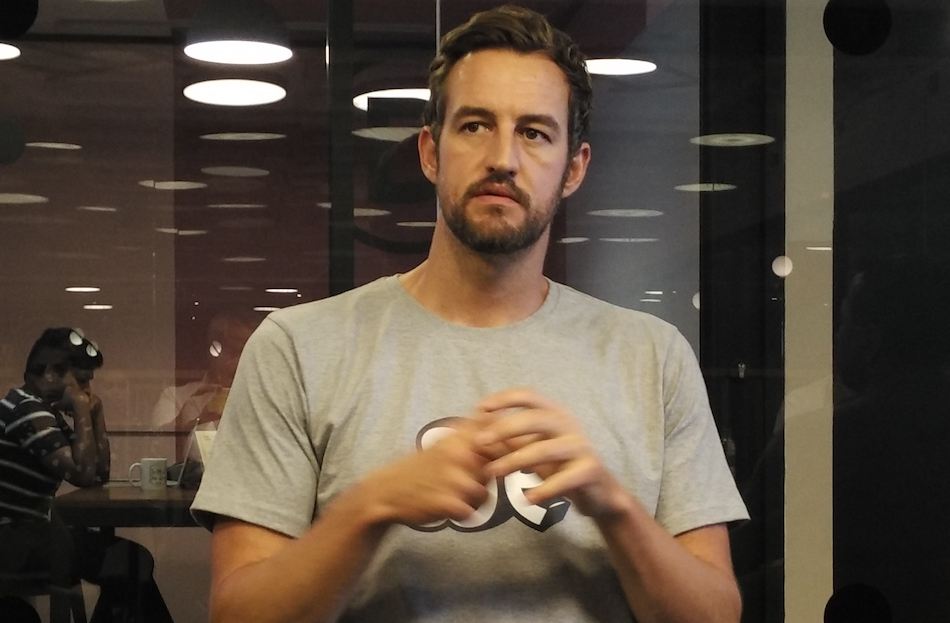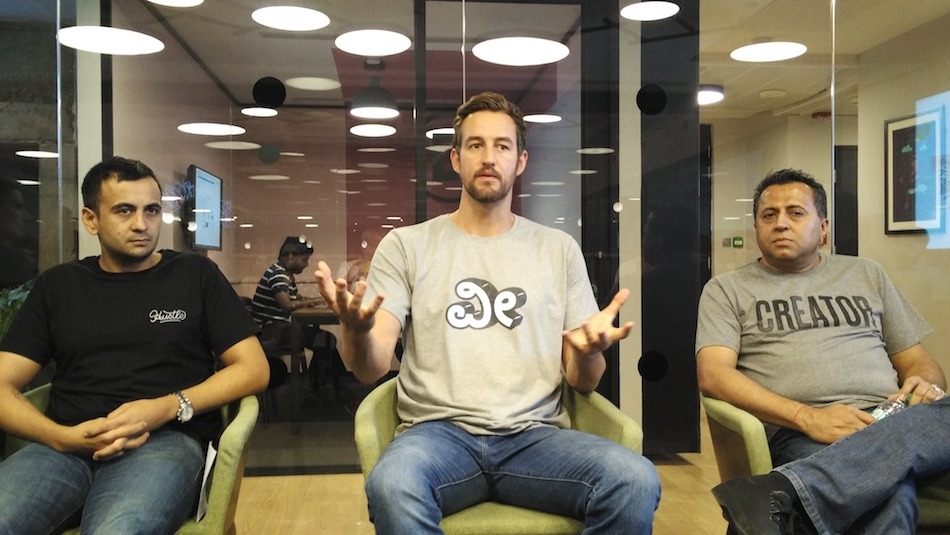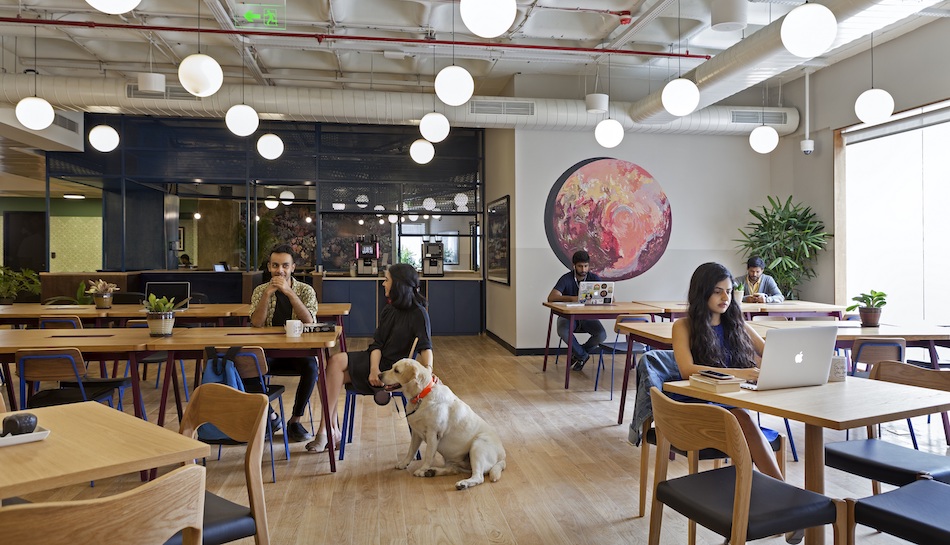
WeWork co-founder Miguel McKelvey. Photo credit: Tech in Asia.
Co-working giant WeWork has been busy lately. How to stay in tune with its ethos even as it expands fast in global markets with local partners is a question that pops up more and more.
It announced an investment of US$4.4 billion from Japanese giant SoftBank last month, brought on board a Chinese consortium led by Hony Capital, and acquired Spacemob in Singapore to drive its expansion across Southeast Asia. It partnered Bangalore real estate billionaire Jitendra Virwani’s Embassy Group to enter India in July, and redesigned a relic from the past – movie theater Galaxy – into a 145,000-square-foot co-working space.
An even larger space of 190,000 square feet came up soon afterwards in Mumbai’s business hub of Bandra Kurla Complex, even as two more locations at Embassy Golf Links IT park and Koramangala in Bangalore are being readied for launch later this year. And in early 2018, the tech hub of Gurgaon near Delhi will have a WeWork too. The goal is to build up 6 million square feet of WeWork space in India over the next four years, says Virwani.
When you have a company like Microsoft which moves in with 400 members, that has an impact on the community, and you want to figure out how to manage that.
But WeWork co-founder Miguel McKelvey, who calls himself the company’s chief culture officer, wants to stay focused on first principles amid the dizzying growth of the US$17-billion unicorn.
“We’re not measuring ourselves by how much money we’ve raised, or how much we’re investing, or how many buildings we have, but by the impact we can make,” he says in Bangalore, during his first visit to India.
The tall McKelvey, sporting a t-shirt with Kannada characters on it, grew up at a commune in Oregon, northwest USA. He shares that community living experience with his co-founder Adam Neumann, whose formative years were in a kibbutz in Israel. The idea of community was central to the launch of WeWork’s co-working spaces in 2010.
“When we started the company, it’s because we believed there was something changing in the world, and certainly India is a perfect example of that – where there’s a shift in what people are looking for out of the time they put into work,” says McKelvey. “That’s the change we’re looking to support. That’s how we measure ourselves, and we’ll continue to invest until we get to that.”
The challenge in doing that becomes apparent during an interaction where McKelvey is flanked by Jitendra Virwani and his son, Karan Virwani – WeWork’s partners in India. It’s easier said than done to balance financial objectives with what it takes to build a vibrant, interactive, and diverse community in India’s Silicon Valley.

WeWork cofounder Miguel McKelvey flanked by Jitendra Virwani (right) and Karan Virwani of the Embassy Group in Bangalore. Photo credit: Tech in Asia.
Enterprise skew
Most early stage startups in India would be hard put to rent a desk in WeWork Galaxy. And Embassy Golf Links – the next WeWork location in Bangalore – is where the likes of IBM and Microsoft rub shoulders with Goldman Sachs and JP Morgan. Many of the world’s largest corporations have large workforces – second only to their home bases – in this tech hub.
Increasingly, it’s the large global enterprises that are attracted to the ambience, services, and flexibility that WeWork provides – and can afford it too. Even the likes of Amazon and Microsoft, which have an established presence in the country with their own facilities, are keen to take up hundreds of seats in WeWork because of the convenience of working out of different locations or the new office dynamic it could provide to creative teams.
Virwani senior says it would be easy to let out the entire Golf Links space to a single, large corporation. But that would go against the WeWork ethos of community building.
“We have to be careful, because in a city like Bangalore, this whole thing can be taken by large enterprises,” says Virwani. “We try to keep a balance – 40 percent small entrepreneurs and 60 percent large enterprises.”
“It’s the other way round,” McKelvey interjects immediately, thus drawing attention to a tension between money and mission as WeWork scales and expands in different parts of the world with local partners.
“60 percent, 40 percent, it could go either way,” continues Virwani. “In Bangalore, companies are willing to take large spaces in these buildings. So we have to be careful in doing that.”
We have to be careful, because in a city like Bangalore, this whole thing can be taken by large enterprises.
His son, Karan Virwani picks up the thread: “We have an enterprise skew perhaps more than in other markets WeWork is in. Global enterprises are growing faster here and they look at WeWork as a global solution. They’re looking at how they’re growing in 10 different cities, so for them WeWork is great because it’s spread across the world. But we have lots of Indian enterprise clients and startups within our space as well.”
He says it’s an ongoing process to build the right culture. “We’re not a landlord, we’re not here to just lease out a building… We know that enterprise is now going to be a big part of WeWork’s growth globally, so we’re working on different models to see how we can be flexible.”
McKelvey also points out that WeWork has over 30 locations in New York alone, and over 20 in London. He expects a similar pattern in other cities, including Bangalore, as demand grows. Then there could be different price points depending on location. But for now, all the WeWork spaces in India are in prime locations, which could be out of the reach of a large section of the entrepreneurial community.
“We invest a lot in the support we’re trying to create, our business model requires a certain level of experience to create the vibe we want, so we’re never going to be an inexpensive solution,” McKelvey tells Tech in Asia. “At the same time, we have found companies that are aspirational and willing to pay the rent at a basic level – you have to be achieving something to be able to be a part of this. It differentiates them from people who’re not taking their business that seriously.”
Global playbook, local strategy
When WeWork started in 2010, the world had just come out of a financial meltdown. Real estate prices had crashed, which worked to WeWork’s advantage in leasing properties. The risk going forward is what happens in the event of another major economic downturn, whether companies would want to rent high-end office spaces even if they provide a hassle-free environment and exalted work-life experience.

WeWork’s Tower 535 co-working space in Hong Kong’s. Photo credit: WeWork.
The rapid expansion in multiple markets aims to mitigate that risk. The scale also creates new possibilities for WeWork from the analytics it can bring to better utilization of space, improving productivity with tech services, and creating opportunities for collaboration between diverse entities. A large part of what clicks for WeWork comes from its design and research insights.
It’s still early days for all of that to come to India. Even though WeWork Galaxy draws upon the global playbook of space utilization, meeting places, and work-life amenities, building out the local WeWork community is at a formative stage.
“We’re new here, so our immediate response is just with our local team and the way that they respond to not only what happens inside the building with members but also with the larger ecosystem in terms of connecting with government initiatives or other organizations that are doing cool things to support startups and small business,” says McKelvey. “Typically our research teams come in later when the whole building is full and operating.”
We’re not a landlord, we’re not here to just lease out a building. We want to create a community.
“Another part,” continues McKelvey, “is that we’re always a mix of the very small, the entrepreneur, the startup, and the larger enterprise companies that join us. We’re always trying to figure out how are we bridging between the two to make sure what we’re offering is mutually beneficial. You have a company like Microsoft which moves in with 400 members, that has an impact on the community and you want to figure out how to cultivate that relationship.”
Christian Lee, MD of WeWork Asia, elaborates on it. “Different parts of town in different cities will have different components to it. Part of what our design and research team does is to understand in each area what is it that’s going to make a community vibrant and the people interactive. You have to look at it building by building and market by market as you expand.”
“I just met a guy having coffee outside, and he teaches the Vedas, trains people to meditate,” adds Jitendra Virwani. “He said he was the second guy to sign up here and he’s got a lot of customers within the building. So there’s a lot of different opportunities, but I think to your question of what science goes into it, it will take us a little more time as we go to different cities.”

WeWork in Bangalore. Photo credit: WeWork.
Philosophical moorings
WeWork India 2.0 with multiple, diverse locations may be some way off, but Karan Virwani already has his sights set on the next three Indian cities on the horizon – the emerging tech hubs of Chennai, Hyderabad, and Pune. The biggest challenge there, too, may be to keep the heterogeneity that creates opportunities for diverse perspectives and useful connections, because large enterprises have a higher capacity to pay and take up large numbers of seats.
See: Techstars launches first center in Asia. Founders explain what’s special about it.
Not surprisingly in this context, Christian Lee, who is now based in Shanghai, defines his main job as finding like-minded partners who can strike the right balance between money and mission, business and culture, revenue and impact.
If the price barrier is too high for a large swathe of Indian startups, for example, there are plenty of local rivals in the likes of BHive Workspace, 91Springboard, Awfis, and The Hive for them to gravitate towards. WeWork’s global presence may be unmatched but the more it tilts towards big enterprise clients, the harder it would get to keep up its entrepreneurial vibe, however cool its office decor, glass partitions, and aroma of roasted coffee may be.
This post WeWork co-founder McKelvey balances a tug-of-war between money and mission appeared first on Tech in Asia.
from Tech in Asia https://www.techinasia.com/wework-cofounder-mckelvey-balances-money-mission-tussle
via IFTTT
No comments:
Post a Comment